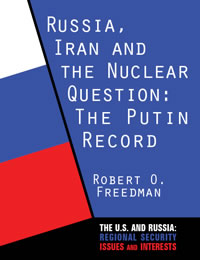Russia, Iran, and the Nuclear Question: The Putin Record

Authored by Dr. Robert O. Freedman.
December 2006
61 Pages
Brief Synopsis
The author analyzes the Russo-Iranian relationship through the spring of 2006. This issue is vitally important in U.S. foreign policy, not just as it relates to Iran and the overall issue of nonproliferation, especially in the Middle East, but also as U.S. foreign policy pertains to relations with Moscow. Thus this monograph should also be read in light of the current crisis with Iran and bearing in mind the dimensions of Iranian proliferation and the issues surrounding it. At the same time, the numerous challenges to regional security in the Middle East, and the addition of great power rivalry to that list, further aggravate Middle East instability and make the search for peace that much more difficult. Consequently, the Russo-American dimension of the Iranian crisis adds to the complexity of the myriad issues and regional challenges to security, and the enduring difficulties in the Russo-American relationship.
SUMMARY
Vladimir Putin inherited a strong Russian-Iranian relationship from his predecessor, Boris Yeltsin. Russia made major arms agreements with Iran under Yeltsin, selling Tehran jet planes, tanks, and submarines, and also began building a nuclear reactor for Iran at Bushehr. The two countries also cooperated on regional issues such as Tajikistan and Afghanistan, and Yeltsin valued the low Iranian profile during the first Chechen war (1994-96).
Putin strengthened the relationship further, beginning his rule by abrogating the Gore-Chenonymdin agreement under which Russia was to cease selling arms to Iran by 2000. While Putin and Iran were to have some problems over Chechnya and the optimal exit route for Caspian Sea oil and natural gas, these were overcome by 2005 when Iran emerged—despite its clandestine nuclear program—as Putin’s most important ally in the Middle East, as Russia sought to reemerge as a major power there. Moscow increasingly became Iran’s protector against the sanctions that first the United States and then the European Union sought to impose because of Iran’s violation of international agreements. Putin’s policy on Iran, however, contained some serious risks for Moscow, including a sharply deteriorating relationship with the United States and the possibility that newly-elected Iranian President Mahmud Ahmadinezhad, an Islamic fundamentalist, might one day challenge Russia over its policy in Chechyna.
Access Full Report [PDF]: Russia, Iran, and the Nuclear Question: The Putin Record
|
NEWSLETTER
|
| Join the GlobalSecurity.org mailing list |
|
|
|

